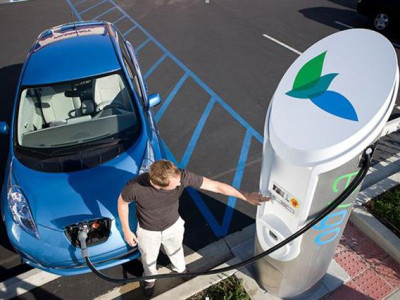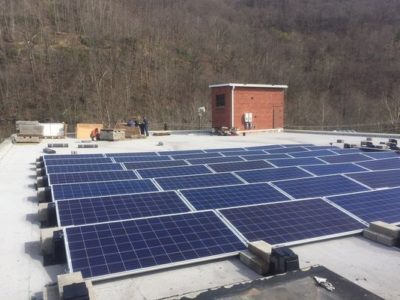Energy
Boosting Electric Vehicle Charging Infrastructure To Meet Demand
Free luncheon and report release event at UCLA Law on Thursday, June 29th, with keynote by Energy Commissioner Janea Scott
Few clean technologies are as central for meeting climate change goals as electric vehicles. Yet in places like California, which leads the U.S. with approximately 300,000 EVs on the road, the needed charging infrastructure is lagging. Analysts estimate that the state will need as many as 220,000 publicly accessible EV charging ports by 2020 to …
Continue reading “Boosting Electric Vehicle Charging Infrastructure To Meet Demand”
CONTINUE READINGThe Dangerous Politics of Nostalgia
It’s a good idea to look in the direction you’re traveling, not backwards to your past.
In an airport, I recently saw a sign above the moving walkway advising us to face in the direction we were traveling. That’s sound advice for life in general and policy making in particular. It’s a recipe for failure to try to restore the past rather than looking toward the future. Unfortunately, rather than embracing the future, …
Continue reading “The Dangerous Politics of Nostalgia”
CONTINUE READINGPlanning for Utility-Scale Solar PV in the San Joaquin Valley
Free evening panel discussion in downtown San Francisco on Tuesday June 6th, 5:30 – 7pm
California aims to generate 50 percent of its electricity from renewable sources by 2030, and a new bill now in the legislature seeks to get to 100% renewables by 2045. A significant amount of this energy will come from solar photovoltaic (PV) installations, with much of the deployment likely to occur in California’s San Joaquin …
Continue reading “Planning for Utility-Scale Solar PV in the San Joaquin Valley”
CONTINUE READINGSlowly and Grudgingly, Change is Coming to Coal Country
Coal is slowly fading from the power mix, even in Mitch McConnell country,
A sign of the times: Fox News has reported, without comment, that the Kentucky Coal Museum is installing solar panels to save money. This is part of a larger trend. On Saturday, the NY Times reported on shifts in power production in states like West Virginia and Kentucky. For instance, Appalachian Power has “closed three …
Continue reading “Slowly and Grudgingly, Change is Coming to Coal Country”
CONTINUE READINGGuest Blogger Alex Jackson: The Way Forward on Cap-and-Trade
Incorporate Elements of SB 775 and AB 378 to Build on a Proven Program
California is in the process of defining the next chapter of its world-renowned climate leadership. Having pioneered a set of policies over the past decade that have put the state on course to meet its greenhouse gas emissions limit in 2020, lawmakers now face the question of what role the state’s cap-and-trade program should play …
Continue reading “Guest Blogger Alex Jackson: The Way Forward on Cap-and-Trade”
CONTINUE READINGGuest Bloggers Michael Wara and Danny Cullenward: Understanding SB 775: A Realistic Path to Achieving California’s Climate Goals
SB 775 Provides a Strong Carbon Pricing Policy and Addresses Legal and Political Constraints
Two recent Legal Planet contributors have shared concerns about SB 775 over the last several days (Ann Carlson’s piece is here and Dallas Burtraw’s is here). We write here to provide context—economic, legal, and political—to help readers, and perhaps even these respected authors, better understand why the bill proposes to extend and evolve California’s approach …
CONTINUE READINGGuest Bloggers Amy Vanderwarker and Kay Cuajunco: Equity at the Center: SB 775 and AB 378 Create New Path Towards More Equitable, Effective Climate Policy
By Prioritizing Equity, We Fight Climate Change, Improve Local Air Quality and Public Health, and Deliver Economic Benefits
California is at a crossroads in our strategy to fight climate change. With the current form of cap and trade due to end in 2020, our state is deciding to what extent carbon pricing will play a role in meeting the 2030 targets enacted in 2016, and if so, what the program will look like. …
CONTINUE READINGFinally, some good news from Congress
The Senate voted 51-49 Wednesday morning against considering a resolution to repeal Obama-era regulations targeting methane emissions from oil and gas operations on federal lands. The Senate was considering whether to vote on rolling back the rule under the Congressional Review Act, which allows the Senate to repeal rules within 60 days of enactment. Three …
Continue reading “Finally, some good news from Congress”
CONTINUE READING“California Alone” Should Not Govern State Climate Policy
SB 775 Turns California Inward and Diminishes Its Role As Global Leader
Last week, Senator Bob Wieckowski (D-Fremont) introduced a new bill, SB 775, that would replace California’s cap-and-trade system with a new approach to regulating California’s greenhouse gas emissions beginning in 2021. There is much to admire in the new bill, including an aggressive pricing approach that would ensure that California’s carbon price remains high. The …
Continue reading ““California Alone” Should Not Govern State Climate Policy”
CONTINUE READINGThe Future of California’s Greenhouse Gas Cap and Trade Program After 2020: A Conversation
Posts on Legal Planet Over the Coming Week, Linked Here, Will Address Pending California Legislation on Cap and Trade from Multiple Perspectives
This post is the preface to a series of posts by multiple authors (including guests) over the coming week (starting May 9) about the future of the state’s cap and trade program for greenhouse gases. Two bills, AB 378 and SB 775, are being debated by the environmental and environmental justice communities, and our bloggers …
CONTINUE READING








